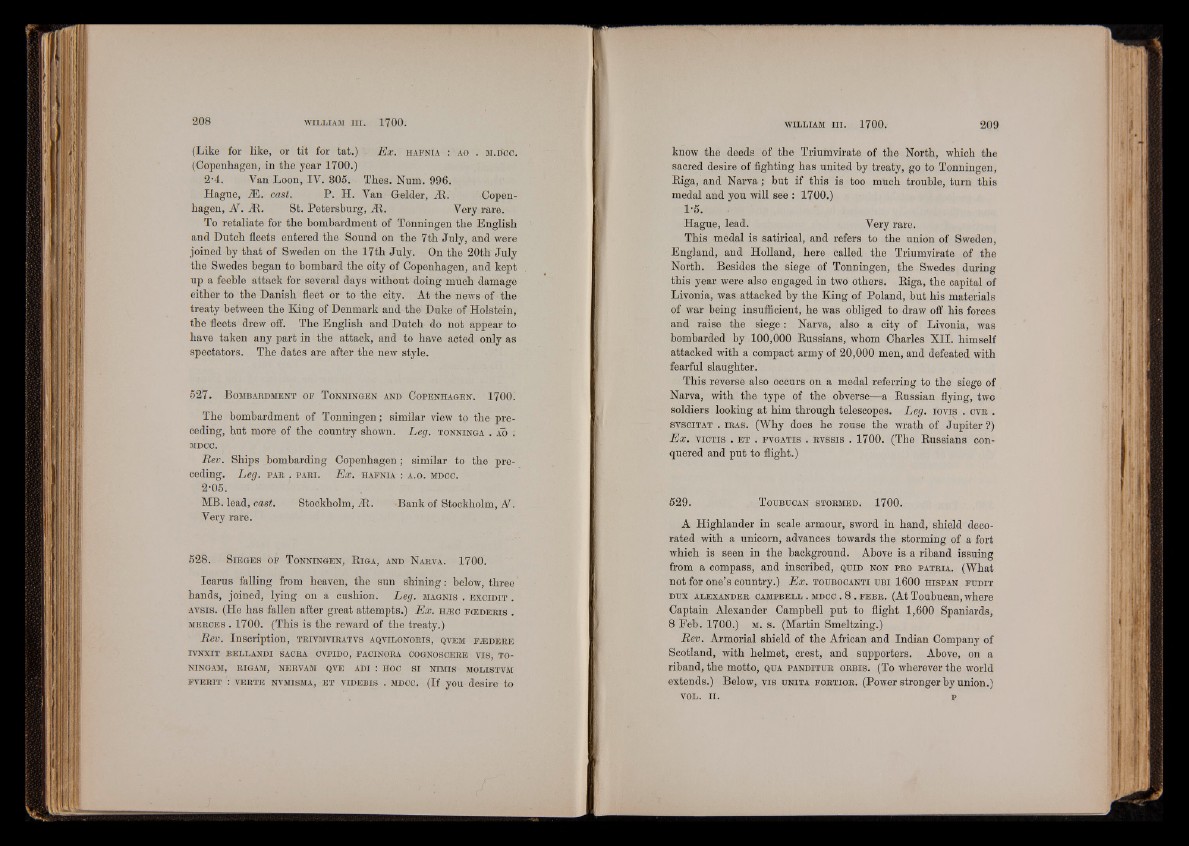
(Like for like, or tit for tat.) . Ex. h a fn ia : ao . m .d c c .
(Copenhagen, in the year 1700.)
2-4. Yan Loon, IV. 805. Thes. Num. 996.
Hague, M. cast. P. H. Yan Gelder, At. Copenhagen,
AT. At. St. Petersburg, iR. Very rare.
To retaliate for the bombardment of Tonningen the English
and Dutch fleets entered the Sound on the 7th July, and were
joined by that of Sweden on the 17th July. On the 20th July
the Swedes began to bombard the city of Copenhagen, and kept
up a feeble attack for several days without doing much damage
either to the Danish fleet or to the city. At the news of the
treaty between the King of Denmark and the Duke of Holstein,
the fleets drew off. The English and Dutch do not appear to
have taken any part in the attack, and to have acted only as
spectators. The dates are after the new style.
527. B om b a r dm en t o f T o n n in g e n and C o p e n h a g e n . 1700.
The bombardment of Tonningen; similar view to the preceding,
hut more of the country shown. Leg. to n n in g a . ao ;
MDCC.
Rev. Ships bombarding Copenhagen; similar to the preceding.
Leg. pa r . p a r i . Ex. h a fn ia : a .o . mdco.
2-05.
MB. lead, cast. Stockholm, 2Et. Bank of Stockholm, N .
Very rare.
528. S ie g e s o f T o n n in g e n , R ig a , and N arva. 1700.
Icarus falling from heaven, the sun shining: below, three
hands, joined, lying on a cushion. Leg. m a g n is . e x c id it .
a v s is . (He has fallen after great attempts.) Ex. h .®c f (e d e r i s .
m e r c e s . 1700. (This is the reward of the treaty.)
Rev. Inscription, tr ivm v ir a tv s a q v ilo n o r is , qvem f ^ d e r e
IVNXIT BELLANDI SACRA CVPIDO, FACINORA COGNOSCERE VIS, TO-
NINGAM, RIGAM, NERVAM QVE ADI : HOC SI NIMIS MOLISTVM
FVERIT : VERTE NVMISMA, ET VIDEBIS . MDCC. (If you desire to
know the deeds of the Triumvirate of the North, which the
sacred desire of fighting has united by treaty, go to Tonningen,
Riga, and Narva; but if this is too much trouble, turn this
medal and you will see : 1700.)
1-5.
Hague, lead. Very rare.
This medal is satirical, and refers to the union of Sweden,
England, and Holland, here called the Triumvirate of the
North. Besides the siege of Tonningen, the Swedes during
this year were also engaged in two others. Riga, the capital of
Livonia, was attacked by the King of Poland, but his materials
of war being insufficient, he was obliged to draw off his forces
and raise the siege: Narva, also a city of Livonia, was
bombarded by 100,000 Russians, whom Charles XII. himself
attacked with a compact army of 20,000 men, and defeated with
fearful slaughter.
This reverse also occurs on a medal referring to the siege of
Narva, with the type of the obverse—a Russian flying, two
soldiers looking at him through telescopes. Leg. io v is . cvr .
sv sc ita t . ir a s . (Why does he rouse the wrath of Jupiter ?)
Ex. v ic t is . e t . fv g a t is . Rvssis . 1700. (The Russians conquered
and put to flight.)
529. T oubucan s t o rm e d . 1700.
A Highlander in scale armour, sword in hand, shield decorated
with a unicorn, advances towards the storming of a fort
which is seen in the background. Above is a riband issuing
from a compass, and inscribed, q u id non p r o pa t r ia . (What
not for one’s country.) Ex. to u b o ca n t i u b i 1600 h is p a n f u d it
d u x Al e x a n d e r Ca m p b e l l . mdcc . 8 . f e b r . (At Toubucan, where
Captain Alexander Campbell put to flight 1,600 Spaniards,
8 Feb. 1700.) m . s . (Martin Smeltzing.)
Rev. Armorial shield of the African and Indian Company of
Scotland, with helmet, crest, and supporters. Above, on a
riband, the motto, q u a p a n d i t u r o r b i s . (T o wherever the world
extends.) Below, vis u n i t a f o r t i o r . (Power stronger by union.)
VOL. I I . p